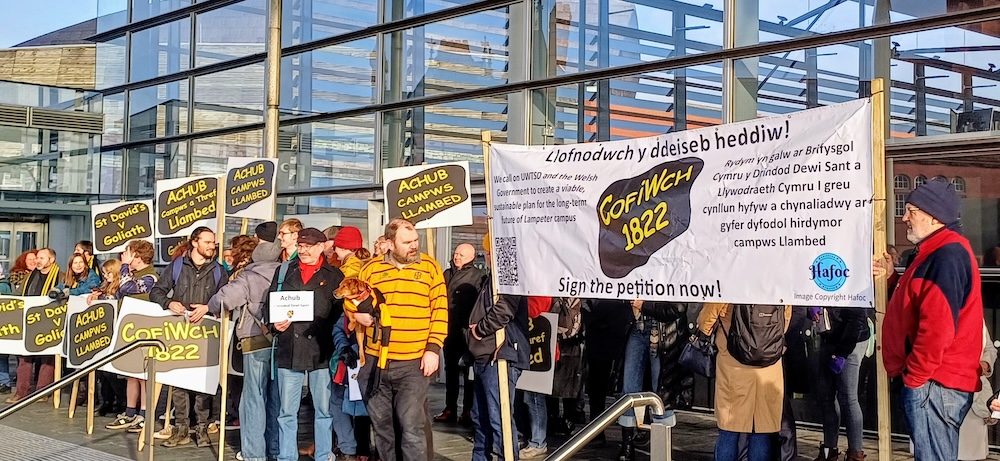Andy Bevan provides an update on the ways forward for University of Wales Trinity St David’s Lampeter campus.
A social movement is getting underway in a small market town in west Wales. On 27 February, 300 local people attended a public meeting which had been called by the University of Wales Trinity St David (UWTSD) in response to objections from Lampeter’s elected representatives – Ben Lake MP, Elin Jones MS and town councillors – to university plans to cease its teaching in Lampeter.
The meeting was remarkable for its size – in a town of barely 2000 residents – and for its mood and confident sense of purpose. The people at the meeting listened to UWTSD’s Vice-Chancellor, Prof. Elwen Evans, who spoke for 50 minutes, attempting to justify the university’s decision. It became very clear, though, that the assembled townspeople of Lampeter were unconvinced by the presentation from the platform and were already focusing on a different set of challenges. Given the university’s announcement of its withdrawal from Lampeter, speakers from the floor emphasised that townspeople had to be the ones driving plans for the future use of the campus; numerous suggestions came from the body of the hall for the continuing use of campus assets on behalf of the community and as an ongoing and vibrant economic hub for Lampeter and its hinterland.
The meeting was remarkable for its size – in a town of barely 2000 residents – and for its mood and confident sense of purpose.
After the meeting, some breathing space was won by the university when it announced the formation of a Key Stakeholder Group, by invitation. This group held its first (and, so far, only) meeting on 27 March. There was a general disappointment among those present at its apparent lack of urgency, by how circumscribed the Stakeholder Group is, subject in every detail to university approval, and by the failure of the university to share vital planning and financial information about the campus. No details have been forthcoming, according to stakeholders, on such elementary things as which buildings are to be retained, which are to be sold or leased, and which are to be demolished. The Vice-Chancellor stated that on-costs for the campus, even if only the valuable Roderic Bowen Library and Archives continue to function, would be £2.7m per year – but no budgeting information to justify this figure has been shared with the Stakeholder Group – despite Freedom of Information requests from the Lampeter Society (of university alumni). Much of this has been reported in the local press.
Syniadau uchelgeisiol, awdurdodol a mentrus.
Ymunwch â ni i gyfrannu at wneud Cymru gwell.
On the other hand, in the aftermath of the 27 March meeting, moves were soon underway to connect Lampeter’s civil society organisations and local representatives more effectively. On 10 April the founding meeting took place of a much larger, more open and more representative group to undertake work immediately to identify viable community uses for the campus assets and to find potential investors and corporate customers – with the intention of reporting back to the university and its Stakeholder group. The new group, now operating as Campws Cymuned Llambed/Community Campus Lampeter has already held three meetings.
A proposal is also being worked on to set up a Community Interest Company which could take over responsibility from the university for campus development.
Ideas currently being investigated include an Integrated Heath Centre, an expanded creche/nursery, social housing possibilities and continued community use of the Sports Hall. The initiative to keep the Sports Hall open is being led by the local netball association, Llewod Llambed/Lampeter Lionesses, who have enlisted business advice from Cwmpas in formulating their detailed business plan.
Other ideas include plans for attracting conferencing business to the campus, a Welsh Government Staff College and a Rugby Hall of Fame – at the site of the first game of rugby in Wales in 1850. There is also a great deal of interest in reviving the Tir Glas initiative, cancelled by UWTSD earlier this year, to promote organic farming, organic food production, catering and eco-tourism.
In Wales, there is a long tradition of rural, community mobilisation. The Welsh countryside, for two hundred years, has had a tradition of rural radicalism, expressed through different parties over the years […]
The university has been asked to approach CADW to carry out a Heritage Impact Assessment in respect of the Old Building, founded in 1822, and the Archives. This would include an assessment of existing plans for the upkeep and continued use of the University Chapel. There are concerns too about plans for the provision of a suitable alternative location for the Lampeter Mosque (which currently has the use of university premises).
The new action committee recognises the importance of the Town Meeting which was held at the end of February and the effective democratic mandate which it gave to save the use of the campus, and a commitment has been made to regular report-backs to the people of Lampeter, with the option of re-convening the Town Meeting when appropriate.
Gofod i drafod, dadlau, ac ymchwilio.
Cefnogwch brif felin drafod annibynnol Cymru.
In Wales, there is a long tradition of rural, community mobilisation. The Welsh countryside, for two hundred years, has had a tradition of rural radicalism, expressed through different parties over the years but clearly shunning the conservatism of much of rural England, for example. The people of Lampeter seem to be aware of those traditions and wish to keep them alive.
All articles published on the welsh agenda are subject to IWA’s disclaimer. If you want to support our work tackling Wales’ key challenges, consider becoming a member.




